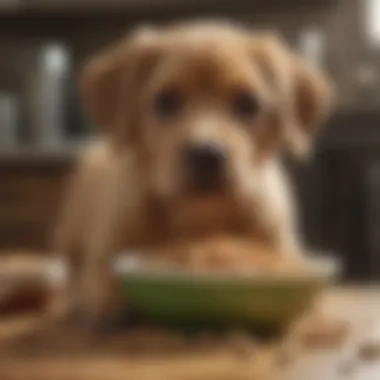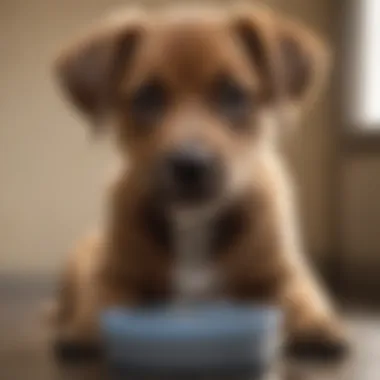What to Give My Puppy for Diarrhea: Effective Remedies


Intro
Diarrhea is a common issue in puppies. It can cause worry not just for the puppy but also for the owner. Understanding the causes and knowing how to respond is vital.
In this guide, we will address what a puppy owner can give their pet during episodes of diarrhea. We will examine dietary changes, hydration tips, and when to consult a veterinarian. This information aims to empower pet owners to tackle diarrhea effectively and ensure their puppy's health and well-being.
Understanding Your Pet
Breed Traits
Different breeds may have varied sensitivities in their digestive systems. For example, small breed puppies like Chihuahuas may be more prone to gastrointestinal issues than larger breeds. Recognizing these traits helps in managing a puppy's health.
Common Temperaments
A puppy’s temperament affects how they react to discomfort, such as diarrhea. Energetic and playful breeds might show signs of distress differently. Understanding your puppy's usual behavior will help you notice abnormal signs that might indicate illness.
Special Needs
Some puppies have specific dietary requirements due to their age, breed, or health conditions. Consult with a veterinarian to identify any special dietary needs your puppy may have. This knowledge is crucial for providing the right care when managing diarrhea.
Pet Care Essentials
Nutrition and Feeding Guidelines
Offer a bland diet for at least 24 hours if your puppy has diarrhea. Boiled chicken or white rice can help settle their stomach. Gradually reintroduce their regular food after the symptoms have improved. Monitor their intake closely to ensure they are eating enough without overdoing it.
Grooming Tips and Techniques
Keep your puppy clean, especially if they have had accidents. Regular grooming helps maintain hygiene. Use gentle, pet-safe wipes to clean them after a bout of diarrhea. This practice prevents further irritation on their skin.
Health and Wellness
Regular check-ups are important. These visits ensure that your puppy stays healthy and can preemptively address any digestive issues. Vaccinations also play a role in preventing diseases that could lead to diarrhea.
When to Consult a Veterinarian
If diarrhea persists for more than 24 hours or is accompanied by vomiting, lethargy, or a loss of appetite, it is essential to consult a veterinarian. They can rule out serious conditions and provide treatment options tailored to your puppy.
Finale
Diarrhea in puppies can be manageable with proper care and knowledge. Understanding your puppy’s needs and offering the right foods can greatly assist in recovery. Always keep an eye on their health, and do not hesitate to seek professional advice when needed.
Understanding Diarrhea in Puppies
Understanding the causes and symptoms of diarrhea in puppies is crucial for pet owners. Diarrhea can lead to severe dehydration and other health issues if not handled promptly. Recognizing the specific type of diarrhea and its implications can help in making informed decisions about treatment and veterinary consultations. Having a clear understanding of diarrhea also helps in mitigating potential health risks and preventing further complications.
Definition and Types of Diarrhea
Diarrhea refers to the condition where a puppy experiences frequent and watery stools. It can be categorized into two main types: acute and chronic. Acute diarrhea often occurs suddenly and lasts for a short duration. Chronic diarrhea persists for a longer period, often exceeding a few weeks. The stool consistency can also vary from mild to severe and may have accompanying symptoms such as vomiting and lethargy.
In some cases, diarrhea can be classified based on its underlying cause. For instance, osmotic diarrhea is caused by the presence of unabsorbed substances in the intestines. Inflammatory diarrhea occurs due to inflammation of the intestinal lining from infections or irritants. Knowing the types can aid in identifying the correct management approach and addressing the root cause effectively.
Common Symptoms to Observe
It is vital for pet owners to pay attention to the symptoms associated with diarrhea. Along with the presence of watery stools, other signs may include:
- Frequent attempts to defecate: Puppies may strain or go more often than usual.
- Vomiting: This often accompanies diarrhea and indicates a more severe gastrointestinal issue.
- Lethargy: A puppy with diarrhea may show little interest in play or normal activities.
- Appetite changes: Decreased or increased appetite can signal various health problems.
- Dehydration signs: Symptoms like dry gums, excessive thirst, or reduced skin elasticity are concerning. Observing these symptoms can provide vital clues to the underlying cause and help in managing the situation better.
When is Diarrhea Considered Serious?
Not all cases of diarrhea are equally severe, but certain indicators suggest when veterinary assistance is necessary. If a puppy experiences persistent diarrhea lasting more than a day or two, it warrants immediate attention. Additional serious signs include:
- Severe dehydration: This can be fatal if not treated promptly.
- Presence of blood or mucus in stools: This is a potential sign of a serious infection or gastrointestinal disease.
- Significant weight loss or lethargy: These can indicate that the puppy is not absorbing nutrients effectively.
- Severe abdominal pain: Puppy may whine or show discomfort when touched. Recognizing these serious indicators can be life-saving and ensures that prompt medical intervention occurs.


Potential Causes of Diarrhea
Understanding the potential causes of diarrhea in puppies is crucial for effective management and treatment. Identifying the underlying factors can influence dietary decisions, hydration protocols, and the urgency of veterinary consultations. Each cause of diarrhea brings its own implications and requires a thoughtful approach. Often, diarrhea may seem like a trivial issue, but recognizing its roots can prevent serious health complications. This section delves into multiple dimensions of causes, aiming to equip pet owners with knowledge for better care.
Dietary Factors
Dietary factors play a significant role in the onset of diarrhea in puppies. The food a puppy consumes can affect its digestive process, leading to varying degrees of gastrointestinal upset.
Sudden Diet Changes
Changing a puppy's diet unexpectedly can lead to digestive disturbances. Puppies have sensitive stomachs, and introducing new foods can upset their balance. This is particularly common if the new diet contains different proteins or fillers than what the puppy is used to. A key characteristic is that sudden shifts can result in an abrupt reaction from the gastrointestinal tract. It is often recommended to change diets gradually over several days. If managed this way, the puppy's system can better adapt, reducing the likelihood of diarrhea.
Food Intolerance
Food intolerance is another common cause. Some puppies may not process certain ingredients well, leading to gastrointestinal upset. The key aspect of food intolerance is that it can manifest even with previously tolerated foods when changes in formulation occur. This variability can be frustrating. Being aware of signs such as loose stool or gas can help pet owners identify food intolerances sooner and adjust diets accordingly.
Contaminated Food
Contaminated food remains a serious threat to a puppy's health. It can happen through improper handling or unsafe storage conditions. The key characteristic of contaminated food is the risk of introducing harmful bacteria or pathogens into the puppy's system. The unique feature of this issue is that it can lead not only to diarrhea but also to more severe conditions if not addressed. Pet owners should always check the freshness and source of their puppy's food to minimize this risk.
Infections and Parasites
Infections and parasites are significant contributors to diarrhea in puppies. Both bacterial and viral infections can compromise the gastrointestinal system, leading to severe symptoms. Understanding these threats helps caregivers recognize when to take action.
Bacterial Infections
Bacterial infections can introduce a host of complications, destabilizing digestion and regular bowel movements. Common culprits include E. coli and Salmonella. The primary characteristic of these infections is the sudden onset of symptoms, often accompanied by lethargy and fever. Bacterial infections can spread quickly, particularly among young puppies or those in crowded environments. It is essential to act swiftly if suspected, usually involving veterinary intervention and specific testing.
Viral Infections
Viral infections, such as parvovirus, present another layer of risk. The critical characteristic of viral infections is that they can be much more severe than bacterial ones. Puppies that are not vaccinated are at high risk. Recognizing early symptoms can be vital for treatment. Quick action is key, as these infections can escalate rapidly, potentially leading to life-threatening conditions.
Parasitic Infestations
Parasitic infestations, such as worms, also commonly cause diarrhea. These infestations can go unnoticed for some time, gradually wearing down the puppy's health. The unique feature is that puppies often acquire these parasites from their environment, making consistent preventive measures important. Pet owners should conduct regular checks and ensure proper deworming schedules to maintain a healthy puppy.
Non-Infectious Causes
Not all causes of diarrhea in puppies relate to infections. Non-infectious factors can also significantly contribute. This understanding is key as it directs attention to lifestyle and health management.
Stress Factors
Stress factors, including changes in environment or routine, can manifest in physical symptoms such as diarrhea. A defining characteristic of stress is its unpredictable nature; what stresses one puppy may not affect another. Pet owners need to observe changes in behavior, particularly following significant life changes, to better manage their puppy's emotional well-being.
Underlying Medical Conditions
Underlying medical conditions can often be behind chronic diarrhea in puppies. Issues such as inflammatory bowel disease or pancreatitis may be at play. The significant aspect is that these conditions often require veterinary testing for proper diagnosis. Recognizing patterns in diarrhea frequency or other accompanying symptoms is crucial in guiding veterinary consultations and treatments.
By understanding these potential causes of diarrhea, pet owners can take informed steps to maintain their puppy's health and well-being.
Initial Steps for Managing Diarrhea
Diarrhea in puppies is a common issue that can often lead to serious health conditions. Therefore, understanding how to handle the initial stages is essential for effective management. This section highlights how important it is to act quickly and understand your puppy's condition. The steps you take can significantly influence recovery and comfort. By assessing situations properly and focusing on hydration, you lay a good foundation for your puppy's recovery.
Assessing the Situation
Recording Symptoms
Recording symptoms is a practical approach that can help you and your veterinarian understand your puppy's state. By keeping a detailed log of instances of diarrhea, frequency, and consistency, you capture vital information. This aspect of documentation allows you to discern patterns over time. A key characteristic of recording symptoms is its precision. It is a beneficial choice because it creates a clear history of your puppy’s health. However, potential downside might be the subjective nature of observations. What seems normal to one owner may differ for another.
Monitoring Activity Levels
Monitoring activity levels is crucial when assessing your puppy's condition. If your puppy becomes lethargic or has less energy than usual, it might indicate a serious issue. This practice offers insight into their overall well-being. A key point here is that it goes beyond just observing diarrhea; it helps evaluate appetite and behavior changes as well. This proactive observation makes it a popular choice for owners concerned about their pet's health. Although it requires attention, neglecting this aspect could mean missing signs of distress.
Hydration Importance


Water Requirements
Water requirements are vital during episodes of diarrhea. Puppies often lose significant amounts of fluid, which leads to dehydration. Understanding how much water your puppy needs helps ensure their recovery. A general rule is to provide small amounts of water frequently rather than allowing them to drink large amounts at once. This characteristic helps keep hydration levels stable without overwhelming their digestive system. A unique feature of maintaining appropriate water intake is that it actively supports bodily functions, reducing other health risks. However, it's crucial to note that forcing water might lead to vomiting, so monitoring remains key.
Recognizing Dehydration Signs
Recognizing dehydration signs becomes essential during any case of diarrhea. Signs such as dry gums, excessive thirst, or skin elasticity should alert you to possible dehydration. This aspect directly correlates to your puppy's health and can guide the urgency of your next actions. A beneficial trait of recognizing these signs is the ability to act swiftly. Early detection can prevent more serious issues. The primary disadvantage can be that some signs might not be evident until dehydration reaches concerning levels. Therefore, pet owners should consistently monitor their puppies, especially during illness.
"Prompt attention to diarrhea can prevent more serious health issues in puppies. Always consider hydration a priority."
By effectively managing the initial steps, you not only support your puppy’s recovery but also equip yourself with information that could be vital for veterinary consultations. Understanding what to observe and prioritize can greatly simplify the process.
Dietary Adjustments for Recovery
Dietary adjustments play a crucial role in recovering a puppy from diarrhea. When a puppy experiences this condition, their digestive system may become sensitive and require a careful approach to feeding. The right diet can help soothe their stomach, give necessary nutrients, and speed up the healing process.
Making temporary dietary changes can have significant benefits. It can reduce irritation in the gastrointestinal tract, allowing it to recover without further stress. Additionally, certain foods can help firm up stool and maintain hydration. Ensuring that the puppy is nourished properly is important for their overall health during recovery.
Recommended Temporary Diet
Boiled Chicken and Rice
Boiled chicken and rice is a popular and highly recommended option for puppies with diarrhea. The combination is simple, easy to digest, and offers necessary nutrients. Boiled chicken provides lean protein, which aids in recovery, while rice serves as a good source of carbohydrates that can help in binding the stool.
One of its key characteristics is that it does not contain any spices or fats, making it gentle on the puppy's stomach. This makes it a beneficial choice for digestive issues. However, it’s important to ensure that the chicken is plain and free from additives. Its major advantage is that it can be easily prepared at home, allowing pet owners to control ingredients.
Plain Pumpkin Puree
Plain pumpkin puree is another well-regarded option for a puppy suffering from diarrhea. It is rich in fiber, which can help firm up loose stools. The soluble fiber content in pumpkin absorbs excess water in the digestive tract, providing relief.
This food is beneficial because it is natural and often palatable to dogs. Its unique feature lies in its ability to support digestive health without the risk of excessive fat or sugar. However, it’s important to use plain pumpkin puree. Avoid pumpkin pie filling, as that contains added sugars and spices that are harmful to dogs.
Plain Yogurt
Plain yogurt can be a helpful dietary adjustment during recovery from diarrhea. It contains probiotics, which are beneficial bacteria that help restore balance in the gut. This is crucial for diarrhea recovery as the good bacteria can assist in digestion and combat harmful pathogens.
Its key characteristic is the probiotic content, making it a popular choice for promoting gastrointestinal health. However, it is essential to choose plain yogurt without added sugars or artificial flavors. While many puppies may enjoy yogurt, a few may be lactose intolerant. It’s wise to start with a small amount to see how your puppy reacts.
Foods to Avoid
Greasy and Rich Foods
Greasy and rich foods should be strictly avoided during a puppy's recovery from diarrhea. Such foods are hard for their sensitive digestive system to process. The high-fat content can lead to further irritation of the gut and exacerbate the diarrhea.
The key characteristic of these foods is their rich and heavy nature, which can be counterproductive in managing gastrointestinal problems. They provide little to no benefits during this time and can delay recovery. Avoid giving your puppy any table scraps or treats high in fat.
Dairy Products
Dairy products are generally not ideal for puppies, particularly when recovering from diarrhea. Many dogs have varying degrees of lactose intolerance, which means they may struggle to digest dairy products properly. Introducing these items can lead to further digestive upset, which worsens the diarrhea.
The key feature of dairy is its lactose content, which can lead to gas and bloating in sensitive puppies. As such, it is wise to eliminate any dairy from their diet during recovery. This helps ensure they can recover quickly without any additional gastrointestinal issues.
To effectively manage your puppy's diarrhea, consider these dietary modifications and remember to monitor their reaction closely.
When to Consult a Veterinarian
Consulting a veterinarian is critical when a puppy experiences diarrhea. Prompt action can lead to an accurate diagnosis and appropriate treatment. Some cases of puppy diarrhea can be mild and easily managed at home. However, there are instances where the condition is serious and could indicate underlying health issues. Knowing when to seek professional help is key for ensuring your puppy's health and vitality.
Signs that Require Immediate Attention
Persistent Diarrhea
Persistent diarrhea is defined as diarrhea that lasts more than 24 hours. This longer duration may lead to dehydration and nutrient deficiencies. Excessive fluid loss can be harmful, especially in puppies. If your puppy is still experiencing diarrhea after a day, it is crucial to consult with a veterinarian. Persistent diarrhea may signal a serious issue such as infections or gastrointestinal disorders. Monitoring your puppy’s condition can provide important information for the vet.
Signs of Severe Dehydration


Severe dehydration occurs when your puppy does not have enough body fluids. Key characteristics include dry gums, excessive thirst, lethargy, and reduced skin elasticity. If you notice these signs, it is vital to take your puppy to the veterinarian as soon as possible. Dehydration can escalate quickly and can be life-threatening if not addressed immediately. Recognizing these signs early can help in preventing serious complications, making this knowledge very valuable.
Presence of Blood or Mucus
If you observe blood or mucus in your puppy's stool, this is cause for concern. Blood can indicate serious infections or intestinal issues, while mucus suggests an irritation in the digestive tract. These symptoms demand immediate veterinary attention. Early intervention can make a significant difference in managing severe conditions that may not be apparent at first glance.
Questions to Ask Your Veterinarian
When visiting the veterinarian, it is important to have a clear understanding of your puppy's condition. This helps in making informed decisions about treatment and care. Here are some essential questions to consider:
Potential Tests and Procedures
Understanding what tests the veterinarian may perform is essential. They might recommend tests such as blood work, fecal examinations, or imaging studies. These tests can help identify underlying causes of diarrhea. Knowing what to expect can reduce anxiety for both you and your puppy during the visit. It's essential to ask how these procedures contribute to diagnosis and what the next steps will be.
Long-term Dietary Changes
Discussing potential long-term dietary adjustments can play an important role in your puppy's overall health. Your veterinarian might suggest integrating certain fibers or specific nutrients into your puppy's diet. These changes can assist in strengthening the digestive system and preventing future gastrointestinal problems. Understanding the rationale behind these recommendations is key for your knowledge as a responsible pet owner.
It is important to remember that seeking veterinary advice early can help protect your puppy's health and wellbeing.
By being vigilant and informed about the signs of diarrhea and when to consult a veterinarian, you can help ensure your puppy receives the necessary care.
Preventive Measures for Future Incidents
Preventive measures play a crucial role in ensuring your puppy's digestive health. Understanding how to reduce the chances of diarrhea helps you maintain a happy and healthy pet. Prevention not only saves time and stress, but it also helps avoid unnecessary veterinary costs. Proper precautions can significantly mitigate the risk of gastrointestinal issues in young dogs.
Gradual Food Transitioning
Changing your puppy's diet should be a careful process. A sudden change in food can upset their stomach, leading to diarrhea or other digestive issues. When introducing a new food, it's best to do so gradually. Start by mixing a small amount of the new food with the current food. Gradually increase the new food's proportion over several days. This method allows your puppy’s digestive system to adjust to the new ingredients more comfortably.
- Step-by-step transition:
- Days 1-2: 25% new food + 75% old food
- Days 3-4: 50% new food + 50% old food
- Days 5-6: 75% new food + 25% old food
- After Day 7: 100% new food
A cautious approach minimizes stress on the digestive system and promotes good health.
Maintaining a Balanced Diet
A balanced diet is essential for preventing digestive issues in puppies. The right balance of proteins, carbohydrates, fats, and essential nutrients supports their growing needs. Avoid feeding low-quality or unsuitable foods, as this can lead to sensitive stomachs. Look for dog food with high-quality ingredients formulated specifically for puppies.
- Key components of a balanced diet:
- Proteins: Supports growth and maintenance
- Carbohydrates: Provides energy
- Fats: Necessary for healthy skin and coat
- Vitamins and minerals: Vital for overall health
It is also wise to observe how your puppy responds to different foods. Adjustments may be necessary to find the ideal diet that works for your puppy’s individual needs.
Regular Veterinary Check-ups
Routine veterinary check-ups are an essential preventive measure. Early detection of potential health issues can prevent serious complications. Your veterinarian can guide you in understanding optimal feeding practices and monitor your puppy’s overall health. Regular visits also allow you to address any concerns about dietary needs or allergies and to ensure your puppy is developing properly.
"Prevention is better than cure". Regular check-ups can significantly lower the risk of health issues that could lead to diarrhea.
By taking these preventive steps, you can help ensure your puppy stays healthy and vibrant, reducing the likelihood of the distressing experience of diarrhea.
Final Thoughts
Understanding how to manage your puppy's diarrhea is crucial for both their health and your peace of mind. This article emphasizes that diarrhea in puppies, while common, often signals underlying issues that require attention. It is essential for pet owners to recognize the signs and take appropriate measures without delay. Feeding strategies, hydration methods, and when to consult a veterinarian are important aspects to consider for effective recovery.
Being proactive can not only alleviate discomfort but also prevent future incidents. A deep understanding of the causes of diarrhea helps in tailoring suitable responses for your unique situation. By embracing this knowledge, you ensure your puppy receives tailored care when it matters most.
Summary of Key Points
- Diarrhea can result from multiple causes including dietary issues, infections, and stress. Recognizing these factors is key to managing the condition effectively.
- Hydration and diet adjustments are immediate steps that can aid recovery. Options like boiled chicken and rice should be considered.
- Monitoring symptoms and general well-being helps determine if veterinary intervention is necessary.
- Preventive measures such as gradual diet transitions and regular veterinary check-ups can reduce the risk of recurrence.
Acknowledging Your Puppy’s Needs
Every puppy has unique needs and responses to illness. It is important to observe their behavior closely during episodes of diarrhea. For instance, some puppies may be more resilient, while others might show significant distress. Always consider their usual habits and routines as deviations could be telling signs of health issues.
- Keeping a diary of their eating patterns and stool quality can give you insights.
- Additionally, recognizing emotional needs during illness is welfare-conscious. Puppies may require additional comfort from their owners.
A comprehensive approach that integrates nutritional care, health monitoring, and emotional support ultimately enhances recovery. Advocating for your puppy’s well-being not only aids in their recovery from diarrhea but also fosters a fundamental bond of trust and care.



